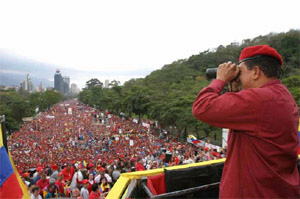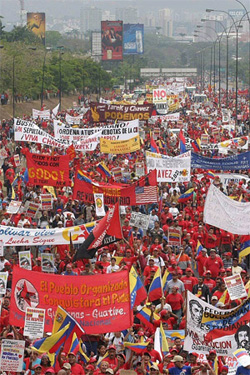DominionSections
Browse Articles
- IndependentMedia.ca
- MostlyWater.org
- Seven Oaks
- BASICS Newsletter
- Siafu
- Briarpatch Magazine
- The Leveller
- Groundwire
- Redwire Magazine
- Canadian Dimension
- CKDU News Collective
- Common Ground
- Shunpiking Magazine
- The Real News
- Our Times
- À babord !
- Blackfly Magazine
- Guerilla News Network
- The Other Side
- The Sunday Independent
- Vive le Canada
- Elements
- ACTivist Magazine
- The Tyee
- TML Daily
- New Socialist
- Relay (Socialist Project)
- Socialist Worker
- Socialist Action
- Rabble.ca
- Straight Goods
- Alternatives Journal
- This Magazine
- Dialogue Magazine
- Orato
- Rebel Youth
- NB Media Co-op
Radio
Venezuela's Political Battle
March 16, 2004
Venezuela's Political Battle

Venezuelan President Hugo Chavez surveys a crowd demonstrating US intervention in Venezuela. photo: Indymedia Argentina
On March 2 the National Electoral Council (CNE) declared that 1,832,493 signatures had been approved and another 876,017 needed verification. These signatures were collected by the opposition in support of a referendum on Chavez's presidency. The opposition has used different measures to attempt to overthrow Chavez in the past. In April 2002 they attempted a coup d'état; later on in December they managed to stop the oil industry, the pillar of Venezuela's economy, for several months. Economists have predicted it would take years to recover what was lost during those months. The opposition has placed all their hopes on the possibility of revoking the Chavez government using the referendum, a tool Chavez himself introduced.
The CNE declared that a corroboration process would be carried out in the following days to prove the legality of the 800,000 signatures that have not yet been recognized. The minimum number necessary to call a referendum is 2.4 million, which represents approximately 20 percent of the Venezuelan electorate. Initially reluctant to accept the CNE decision, the opposition resorted to violent protests to express their disagreement. The riots that lasted for at least five days left 9 dead and many wounded. Both sides suffered losses during the demonstrations and several members of the National Guard and policemen were wounded.
The authenticity of 876,017 signatures was called into question due to similar handwriting used to enter large numbers of signatures. This, despite numerous clarifications from the CNE stating that everyone had to fill in forms in their own handwriting, with the only exception being the illiterate or handicapped. In Venezuela, 91.1 percent of the total population over the age of 15 are literate.
This is the first referendum of this nature in the democratic history of Venezuela, and the first of its kind for the whole Latin American region. That explains some of the flaws in the process and the need for thorough revision of signatures before giving a final result.
If all of the signatures collected by the opposition are validated, they will add up to 2.6 million, a fraction of the 11 million Venezuelan voters. It is said that abstention at the polls is on the rise. However, even assuming that 50 percent of the voters refrain from voting, the opposition could still be far away from winning against Chavez. The Constitution states that in order to revoke Chavez's presidency his rivals would need to get at least as many votes as the president received in the 2000 election, i.e. 3.76 million votes.
Further more, the opposition is a conglomerate of different parties that before Chavez came to power were always disputing supremacy. The unity among these parties is only a fragile one, a unity that will be broken if they manage to vote Chavez out. A separation of the opposition will make it even harder for them to win against Chavez, who is still quite popular, especially among the poor.
Some hold the theory that the opposition had already done this math and seeing the improbability of defeating Chavez in a referendum tried to resemble Haiti's situation hoping for an international intervention. US administration has kept a hostile stand toward the Chavez government, partly motivated by Chavez's defiance of US plans in the Americas. During the Summit of the Americas held in Monterey, Chavez along with Argentina's Kirchner and Brazil's Lula rejected the American-proposed free trade agreement. Recently, Chavez has been increasingly adamant in his accusations of US intervention in Venezuela. Meanwhile, spokesmen from the opposition have appealed for a foreign intervention.After Colin Powell invited the opposition to submit to the reparation of the signatures, there was a sudden decline in anti-Chavez demonstrations.
Venezuela's commercial newspapers and TV companies openly support actions against the president and have called for violence in pursuit of their interests. The international media coverage has been rather poor. It appears that the international media base their reports on coverage in the fiercely partisan local media, detracting from their claim to objectivity. It is also common for international press to cite numbers out of context. For instance, the figure of 3.4 million signatures that the opposition claims to have has been widely reported, but very few have mentioned that there are 11 million voters in Venezuela.
Being cynical, one might predict that they'll wait until the next election, hoping for a new messiah who promises to save the country.
Related articles:
By the same author:
Archived Site
The Dominion is a monthly paper published by an incipient network of independent journalists in Canada. It aims to provide accurate, critical coverage that is accountable to its readers and the subjects it tackles. Taking its name from Canada's official status as both a colony and a colonial force, the Dominion examines politics, culture and daily life with a view to understanding the exercise of power.
